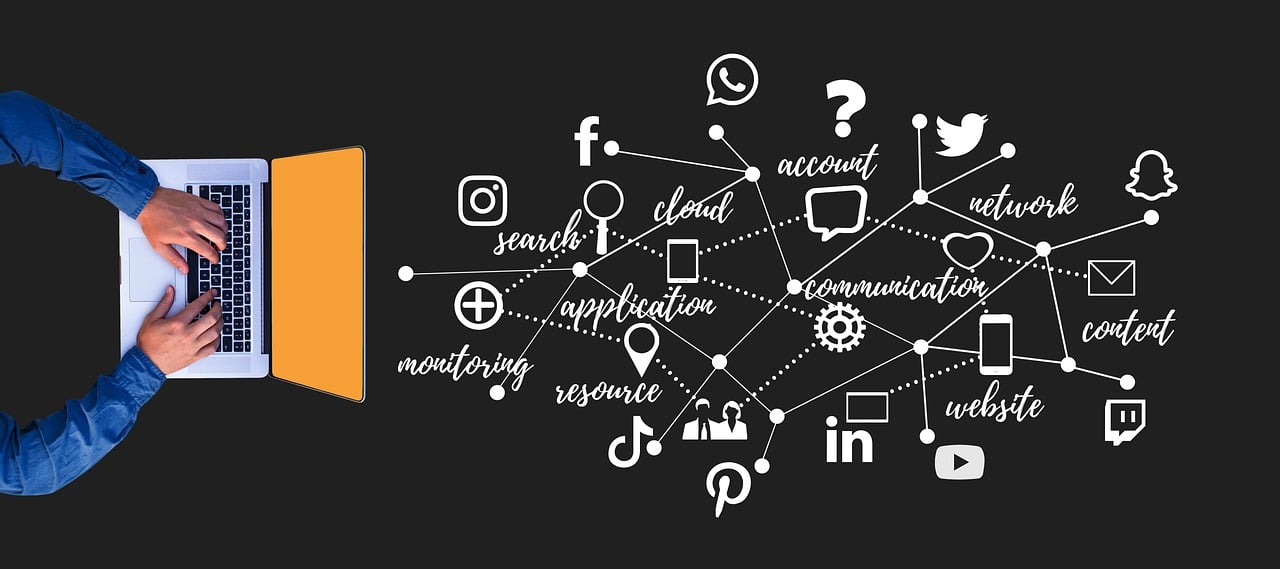Call us: 9700543928

Introduction
What is Digital Marketing?
Digital marketing refers to the use of digital channels, such as search engines, social media, email, and websites, to promote products or services and connect with potential customers.
Importance of Digital Marketing
In today’s digital age, having a strong online presence is crucial for businesses of all sizes. Digital marketing offers numerous benefits and opportunities for businesses to reach and engage with their target audience more effectively.
Key Components of Digital Marketing
Search Engine Optimization (SEO): Optimizing websites to improve their visibility and ranking on search engine result pages.
Social Media Marketing: Utilizing social media platforms to build brand awareness, engage with customers, and drive website traffic.
Email Marketing: Sending targeted emails to communicate with customers, promote products or services, and build customer loyalty.
Content Marketing: Creating and sharing valuable content to attract and retain customers.

Benefits of Digital Marketing
Increased brand visibility and awareness Targeted audience reach Cost-effective compared to traditional marketing Measurable and trackable results Enhanced customer engagement and interaction Improved lead generation and conversion Global reach and accessibility
Frequently Asked Questions
How long does it take to see results from digital marketing efforts?
What is the role of data analytics in digital marketing?
How can businesses measure the success of their digital marketing campaigns?
What are some common digital marketing challenges and how can they be overcome?
What are the latest trends and innovations in digital marketing?
These are just a few of the questions that will be addressed throughout this presentation.
Understanding Digital Marketing
What is Digital Marketing?
Digital marketing refers to the use of digital channels, such as websites, social media, search engines, and email, to promote products or services and reach a target audience.
Benefits of Digital Marketing
Increased Reach: Digital marketing allows you to reach a global audience and target specific demographics.
Cost-Effective: Compared to traditional marketing methods, digital marketing is often more affordable and offers better ROI.
Measurable Results: With digital marketing, you can track and measure the success of your campaigns in real time.
Targeted Advertising: Digital marketing enables you to target specific audiences based on demographics, interests, and behaviors.
Improved Customer Engagement: Through social media and personalized content, digital marketing helps you build stronger relationships with your customers.
Key Components
Website: A well-designed and user-friendly website is the foundation of any digital marketing strategy.
Search Engine Optimization (SEO): Optimizing your website to rank higher in search engine results and drive organic traffic.
Content Marketing: Creating and distributing valuable and relevant content to attract and engage your target audience.
Social Media Marketing: Utilizing social media platforms to connect with your audience, build brand awareness, and drive traffic to your website.
Email Marketing: Sending targeted emails to nurture leads, promote products or services, and build customer loyalty.
Pay-Per-Click (PPC) Advertising: Running paid ads on search engines and social media platforms to drive targeted traffic to your website.
Analytics and Reporting: Tracking and analyzing data to measure the effectiveness of your digital marketing efforts and make data-driven decisions.
Frequently Asked Questions (FAQs)
1 How long does it take to see results from digital marketing?
The timeline for seeing results can vary depending on factors such as your industry, competition, and the strategies you implement. However, it’s important to note that digital marketing is a long-term investment that requires consistent effort.
2 Do I need a large budget for digital marketing?
The budget for digital marketing can vary depending on your goals and the strategies you choose. While some channels may require a larger budget, there are also cost-effective options available.
3 Is digital marketing only for online businesses?
No, digital marketing can benefit both online and offline businesses. It can help drive foot traffic to physical stores, generate leads, and build brand awareness.
4 How can I measure the success of my digital marketing campaigns?
By tracking key performance indicators (KPIs) such as website traffic, conversion rates, engagement metrics, and ROI, you can measure the success of your digital marketing campaigns.

Importance of Digital Marketing in Modern Business
Digital marketing plays a crucial role in the success and growth of modern businesses. Here are some key reasons why it is important:
- Reach a Wider Audience
Digital marketing allows businesses to reach a global audience, breaking geographical barriers. With the Internet and social media platforms, businesses can target and engage with customers from different parts of the world, expanding their reach and potential customer base. - Cost-Effective
Compared to traditional marketing methods, digital marketing is more cost-effective. It offers various affordable and flexible advertising options, such as social media ads, email marketing, and search engine optimization (SEO). This allows businesses, especially startups and small businesses, to compete with larger companies without a massive marketing budget. - Measurable Results
Digital marketing provides measurable results, allowing businesses to track the success and effectiveness of their marketing campaigns. Through analytics and data, businesses can analyze customer behavior, engagement, conversion rates, and other key metrics. This data-driven approach helps businesses make informed decisions and optimize their marketing strategies. - Targeted Marketing
Digital marketing allows businesses to target specific demographics, interests, and behaviors. With tools like audience segmentation and personalized advertising, businesses can create targeted campaigns that resonate with their ideal customers. This increases the chances of conversion and customer retention. - Brand Building
Digital marketing plays a crucial role in brand building. It helps businesses establish and reinforce their brand identity through consistent messaging, visuals, and interactions. By creating a strong online presence and engaging with customers through social media and content marketing, businesses can build brand awareness, trust, and loyalty. - Adaptability and Flexibility
Digital marketing offers businesses the ability to adapt and adjust their marketing strategies based on real-time data and market trends. Unlike traditional marketing, digital marketing allows for quick changes and optimizations, ensuring that businesses stay relevant and competitive in a rapidly evolving digital landscape. - Customer Engagement
Digital marketing provides various channels for businesses to engage and interact with their customers. Through social media, email marketing, and content marketing, businesses can build relationships, gather feedback, and provide personalized experiences. This fosters customer loyalty and advocacy. - Competitive Advantage
In today’s digital age, businesses that embrace digital marketing gain a competitive advantage. By leveraging digital platforms and technologies, businesses can differentiate themselves, stand out from competitors, and capture the attention of their target audience.
Digital marketing is no longer a luxury but a necessity for businesses of all sizes. It offers numerous benefits, from reaching a wider audience to building a strong brand and driving growth. By incorporating digital marketing strategies into their overall business strategies, businesses can stay relevant, competitive, and successful in the modern business landscape.
What is Digital Marketing?
Definition
Digital marketing refers to the use of digital channels, such as websites, social media platforms, search engines, email, and mobile apps, to promote products, services, and brands. It encompasses various online marketing strategies and tactics aimed at reaching and engaging target audiences.
Scope in Modern Business
In today’s digital age, digital marketing has become an essential component of any successful business strategy. It allows businesses to connect with their target customers, build brand awareness, drive website traffic, generate leads, and ultimately increase sales and revenue. With the widespread use of the internet and digital devices, digital marketing offers businesses unprecedented opportunities to reach and engage a global audience.
Evolution of Digital Marketing
Digital marketing has undergone significant transformation over the years, adapting to the changing landscape of technology and consumer behavior. From its early beginnings to the present day, digital marketing has become an essential component of modern business strategies, offering numerous benefits and opportunities for businesses to connect with their target audience.
1 Traditional Marketing
Traditional marketing refers to traditional advertising channels such as print media, television, radio, and direct mail. While still relevant, traditional marketing has evolved to incorporate digital elements in order to reach a wider audience.
2 Internet Marketing
With the rise of the internet, businesses began to leverage online channels such as websites, search engines, and email marketing to reach their target audience. Internet marketing opened up new possibilities for targeting and tracking consumer behavior.
3 Social Media Marketing
The advent of social media platforms like Facebook, Twitter, and Instagram revolutionized digital marketing. Businesses could now engage directly with their audience, build brand awareness, and drive customer engagement through targeted social media campaigns.
4 Mobile Marketing
As smartphones became ubiquitous, mobile marketing emerged as a powerful channel for reaching consumers on the go. Mobile apps, SMS marketing, and location-based advertising allow businesses to deliver personalized and timely messages to their target audience.
5 Content Marketing
Content marketing focuses on creating and distributing valuable, relevant, and consistent content to attract and retain a clearly defined audience. It encompasses various forms of content, including blog posts, videos, infographics, and more.
6 Influencer Marketing
Influencer marketing leverages the reach and influence of popular individuals or influencers to promote products or services. Influencers have a dedicated following and can help businesses reach their target audience in an authentic and engaging way.
7 Video Marketing
Video marketing has gained popularity in recent years, with platforms like YouTube and TikTok becoming major players in the digital marketing landscape. Video content allows businesses to convey their message in a more engaging and memorable way.
Significance of Digital Marketing Today
Digital marketing has become an essential component of modern business strategies. It plays a crucial role in driving success by leveraging the power of digital channels to reach and engage with target audiences. Here are some key reasons why digital marketing is significant in today’s business landscape:
Increased Online Presence
In today’s digital age, consumers spend a significant amount of time online. Digital marketing allows businesses to establish a strong online presence and reach potential customers where they spend most of their time.
Targeted Audience Reach
Digital marketing enables businesses to target specific audiences based on demographics, interests, and behaviors. This targeted approach ensures that marketing efforts are directed toward the right people, increasing the chances of conversion and customer acquisition.
Cost-Effectiveness
Compared to traditional marketing methods, digital marketing is often more cost-effective. It allows businesses to reach a wider audience at a fraction of the cost, making it an attractive option for businesses of all sizes.
Measurable Results
Digital marketing provides measurable results, allowing businesses to track the performance of their marketing campaigns in real time. This data-driven approach enables businesses to make data-backed decisions and optimize their marketing strategies for better results.
Improved Customer Engagement
Digital marketing offers various channels for businesses to engage with their customers, such as social media, email marketing, and content marketing. These channels facilitate two-way communication, allowing businesses to build stronger relationships with their customers and provide personalized experiences.
Competitive Advantage
In today’s competitive business landscape, digital marketing can give businesses a competitive edge. By leveraging digital channels effectively, businesses can differentiate themselves from competitors and stay ahead in the market.
FAQs
Q: Is digital marketing suitable for all businesses?
A: Yes, digital marketing can benefit businesses of all sizes and industries. It offers a flexible and scalable approach to reaching and engaging with target audiences.
Q: How long does it take to see results from digital marketing efforts?
A: The timeline for seeing results from digital marketing efforts can vary depending on various factors such as the marketing strategy, industry, competition, and target audience. However, businesses can start seeing some initial results within a few weeks or months.
Q: What are some common digital marketing channels?
A: Some common digital marketing channels include search engine optimization (SEO), social media marketing, email marketing, content marketing, pay-per-click (PPC) advertising, and influencer marketing.
Q: How can businesses measure the success of their digital marketing campaigns?
A: Businesses can measure the success of their digital marketing campaigns through various metrics such as website traffic, conversion rates, click-through rates, engagement rates, and return on investment (ROI).
Q: Is digital marketing a one-time effort?
A: No, digital marketing requires ongoing efforts to stay relevant and effective. It involves continuous monitoring, analysis, and optimization to ensure that marketing strategies align with changing consumer behaviors and market trends.
Shifting Consumer Behavior
Changing Landscape
Consumer behavior is constantly evolving, driven by technological advancements and societal changes. Understanding these shifts is crucial for effective digital marketing strategies.
Mobile Dominance
With the widespread adoption of smartphones and tablets, consumers are increasingly accessing digital content on mobile devices. Marketers must optimize their strategies for mobile platforms.
Personalization Demands
Consumers expect personalized experiences and targeted messaging. Marketers must leverage data and analytics to deliver relevant content and tailored offers.
Social Media Influence
Social media platforms have become integral to consumer decision-making. Marketers must engage with customers on social channels and leverage influencer marketing.
Competitive Landscape
Market Saturation
Digital marketing is a highly competitive field with numerous players vying for attention and market share. Businesses must navigate through a crowded marketplace to stand out and reach their target audience.
Changing Consumer Behavior
Consumer behavior is constantly evolving, and businesses must adapt to keep up with the changing trends and preferences. Staying ahead of the competition requires a deep understanding of consumer needs and effective targeting strategies.
Technological Advancements
The digital marketing landscape is shaped by rapid technological advancements. Businesses need to stay updated with the latest tools, platforms, and techniques to remain competitive and leverage new opportunities.
Resource Allocation
Digital marketing requires significant resources, including time, budget, and skilled personnel. Businesses must carefully allocate their resources to maximize their marketing efforts and outperform their competitors.
Data Privacy and Security
As digital marketing relies heavily on data collection and analysis, businesses must address concerns related to data privacy and security. Building trust with consumers and implementing robust security measures are crucial in the competitive landscape.
Adapting to Algorithm Changes
Digital marketing platforms often update their algorithms, affecting the visibility and reach of businesses’ marketing efforts. Staying agile and adapting to algorithm changes is essential to maintain a competitive edge.
Key Components of Digital Marketing
Search Engine Optimization (SEO)
Optimizing website content and structure to improve organic search engine rankings.
Increasing visibility and driving targeted traffic to the website.
Content Marketing
Creating and distributing valuable, relevant, and consistent content to attract and engage the target audience.
Building brand authority and generating leads through informative and educational content.
Social Media Marketing
Utilizing social media platforms to promote products or services, build brand awareness, and engage with the target audience.
Running targeted advertising campaigns and fostering customer relationships.
Email Marketing
Sending targeted emails to prospects and customers to nurture relationships, promote products or services, and drive conversions.
Building customer loyalty and increasing repeat purchases.
Pay-Per-Click (PPC) Advertising
Running paid advertising campaigns on search engines and social media platforms.
Driving immediate traffic and conversions through targeted ads and bidding on relevant keywords.

Search Engine Optimization (SEO)
What is SEO?
Search Engine Optimization (SEO) is the practice of optimizing a website to improve its visibility and ranking on search engine results pages (SERPs).
Importance of SEO
SEO is crucial for businesses as it helps increase organic traffic to their websites.
It improves website visibility, making it easier for potential customers to find the business online.
SEO can enhance the user experience and usability of a website.
It is cost-effective compared to other digital marketing strategies.
Key Components of SEO
Keyword research
On-page optimization
Off-page optimization
Technical SEO
Content creation and optimization
Benefits of SEO
Increased website traffic
Higher visibility and brand awareness
Improved user experience
Higher conversion rates
Long-term results

Content Marketing
Role of Content Marketing
Content marketing plays a crucial role in digital marketing strategies by creating and distributing valuable content to attract and engage target audiences. It involves the creation and sharing of relevant and valuable content such as blog posts, articles, videos, and infographics to educate, entertain, and inspire potential customers.
Effective Strategies
To create and distribute valuable content, consider the following strategies:
Define your target audience and understand their needs and preferences.
Develop a content strategy that aligns with your business goals and target audience.
Create high-quality, informative, and engaging content that provides value to your audience.
Use a mix of different content formats such as blog posts, videos, podcasts, and social media posts.
Optimize your content for search engines to improve visibility and reach.
Promote your content through various channels such as social media, email marketing, and influencer partnerships.
Measure and analyze the performance of your content to make data-driven improvements.
Stay up-to-date with industry trends and adapt your content strategy accordingly.

Social Media Marketing
Importance of Social Media Marketing
Social media marketing is a powerful tool for businesses to build brand awareness and engage with their target audience. With billions of users on platforms like Facebook, Instagram, and Twitter, social media provides a vast reach and the potential to connect with customers on a personal level.
Building Brand Awareness
Social media allows businesses to showcase their brand personality and values through engaging content. By consistently sharing relevant and valuable content, businesses can increase brand visibility and attract new customers.
Engaging with the Target Audience
Social media provides a platform for businesses to directly interact with their target audience. By responding to comments, messages, and mentions, businesses can build relationships and create a sense of community with their customers.

Email Marketing
Customer Engagement
Email marketing is a powerful tool for engaging with customers and building strong relationships. It allows businesses to reach their target audience directly and deliver personalized content.
Crafting Compelling Email Campaigns
To create effective email campaigns, consider the following strategies:
Personalization: Tailor the content to each recipient’s preferences and interests.
Clear Call-to-Action: Include a clear and compelling call-to-action to encourage recipients to take the desired action.
Mobile Optimization: Ensure that emails are mobile-friendly to reach a wider audience.
A/B Testing: Experiment with different subject lines, content, and designs to optimize campaign performance.
Pay-Per-Click (PPC) Advertising
What is PPC Advertising?
PPC advertising is an online advertising model where advertisers pay a fee each time their ad is clicked. It is a way of buying visits to your website, rather than attempting to earn those visits organically.
Benefits of PPC Advertising
Targeted Traffic: PPC allows you to target specific keywords, demographics, and locations, ensuring your ads reach the right audience.
Maximized ROI: With PPC, you only pay when someone clicks on your ad, making it a cost-effective way to drive traffic and generate leads.
Immediate Results: Unlike organic search, PPC ads can start driving traffic to your website immediately after launching your campaign.
Measurable and Trackable: PPC platforms provide detailed analytics and reporting, allowing you to measure the success of your campaigns and make data-driven decisions.
Benefits of Digital Marketing
Increased Brand Visibility
Digital marketing allows businesses to reach a wider audience and increase their brand visibility.
By leveraging various online channels such as social media, search engines, and email marketing, businesses can showcase their products or services to potential customers.
Targeted Audience Reach
One of the key advantages of digital marketing is the ability to target specific audience segments.
Businesses can use data-driven strategies to identify their target audience and deliver personalized messages or advertisements.
This targeted approach increases the chances of reaching potential customers who are more likely to be interested in the products or services being offered.
Cost-Effectiveness
Compared to traditional marketing methods, digital marketing is often more cost-effective.
Businesses can allocate their marketing budget more efficiently by targeting specific audience segments and measuring the performance of their campaigns.
Digital marketing also offers various cost-effective channels such as social media advertising and email marketing, which can be tailored to fit different budget sizes.
Measurable Results
With digital marketing, businesses can track and measure the performance of their marketing campaigns in real time.
Key metrics such as website traffic, conversion rates, and engagement levels can be monitored and analyzed.
This data-driven approach allows businesses to make data-backed decisions and optimize their marketing strategies for better results.
Required Materials
Access to Tools and Platforms
To implement digital marketing strategies, you will need access to various tools and platforms such as social media management tools, email marketing software, content management systems (CMS), and customer relationship management (CRM) systems.
Understanding of the Target Audience
A deep understanding of your target audience is crucial for effective digital marketing. This includes conducting market research, creating buyer personas, and analyzing customer data to tailor your marketing messages and campaigns to their specific needs and preferences.
Content Creation Skills
Digital marketing relies heavily on content creation, including writing engaging blog posts, creating compelling social media posts, designing eye-catching visuals, and producing informative videos. Developing strong content creation skills is essential for successful digital marketing.
Analytical Tools for Monitoring Campaign Performance
To measure the effectiveness of your digital marketing campaigns, you will need access to analytical tools such as Google Analytics, social media analytics, and email marketing analytics. These tools provide valuable insights into key metrics like website traffic, engagement, conversion rates, and ROI.
Is It Possible…?
Essential Skills
Digital marketing requires a combination of analytical and creative skills. Proficiency in data analysis, content creation, social media management, and SEO optimization is essential for success.
Timeline for Results
Digital marketing is an ongoing process, and results can vary depending on various factors such as industry, target audience, and marketing strategies. It may take several months to see significant results, but continuous efforts can lead to long-term success.
Common Mistakes to Avoid
Neglecting to define clear goals and objectives
Failing to target the right audience
Not tracking and analyzing data
Overlooking the importance of mobile optimization
Ignoring customer feedback and engagement
Choosing the Right Channels
Selecting the right digital marketing channels depends on your target audience and marketing goals. Popular channels include social media platforms, email marketing, search engine advertising, content marketing, and influencer partnerships.
Suitability for Small Businesses
Digital marketing offers numerous benefits for small businesses, including cost-effectiveness, targeted marketing, increased brand visibility, and the ability to compete with larger competitors. It allows small businesses to reach a wider audience and build meaningful connections with customers.
Can you…?
Tailor Digital Marketing Strategies to Your Industry
Digital marketing strategies can be customized to fit the unique needs and goals of different industries. By understanding the specific challenges and target audience of your industry, you can develop a tailored approach that maximizes your digital marketing efforts.
Implement Digital Marketing Tactics Without Prior Experience
While prior experience in digital marketing can be beneficial, it is not a requirement to get started. There are numerous resources available, such as online courses, tutorials, and guides, that can help you learn and implement digital marketing tactics effectively. With dedication and a willingness to learn, you can successfully navigate the world of digital marketing.
Why You Should Invest in Digital Marketing
Increased Reach: Digital marketing allows businesses to reach a larger audience compared to traditional marketing methods. With the widespread use of the internet and social media platforms, businesses can target and engage with potential customers from around the world.
Cost-Effective: Digital marketing is often more cost effective than traditional marketing. Businesses can create and distribute digital content at a fraction of the cost of traditional advertising methods such as print ads or TV commercials.
Measurable Results: Unlike traditional marketing, digital marketing allows businesses to track and measure the results of their marketing efforts. Through analytics and data tracking tools, businesses can gain insights into the performance of their campaigns and make data-driven decisions.
Targeted Advertising: With digital marketing, businesses can target their advertising efforts to specific demographics, interests, and behaviors. This targeted approach increases the chances of reaching the right audience and generating higher conversion rates.
Brand Visibility: Digital marketing helps businesses increase their brand visibility and online presence. By consistently creating and sharing valuable content, businesses can establish themselves as industry leaders and build trust with their audience.
Personalization: Digital marketing allows businesses to personalize their marketing messages and tailor them to individual customers. By leveraging customer data and segmentation, businesses can deliver personalized experiences that resonate with their target audience.
Real-Time Engagement: Digital marketing enables real-time engagement with customers. Businesses can interact with their audience through social media, email marketing, live chat, and other digital channels, fostering customer loyalty and building stronger relationships.
Competitive Advantage: Investing in digital marketing gives businesses a competitive advantage in today’s digital landscape. By staying ahead of the curve and embracing digital technologies, businesses can outperform their competitors and adapt to changing consumer behaviors.
Flexibility and Scalability: Digital marketing offers businesses flexibility and scalability. Campaigns can be easily adjusted and optimized based on real-time data, and businesses can scale their marketing efforts as their needs and goals evolve.
Integration with Other Channels: Digital marketing can be seamlessly integrated with other marketing channels such as offline advertising, PR, and events. By combining different marketing strategies, businesses can create a holistic and cohesive brand experience for their customers.

Ways to Leverage Data Analytics in Digital Marketing
Data-driven Targeting
Use data analytics to identify and understand your target audience’s preferences, behaviors, and demographics.
Tailor marketing campaigns to specific customer segments for better engagement and conversion rates.
Performance Tracking
Monitor and analyze key performance indicators (KPIs) to measure the effectiveness of your digital marketing efforts.
Identify areas of improvement and optimize marketing strategies based on data insights.
Personalization
Utilize data analytics to deliver personalized content and experiences to your target audience.
Leverage customer data to create tailored messaging, recommendations, and offers.
Predictive Analytics
Harness the power of predictive analytics to forecast customer behavior and trends.
Anticipate customer needs and preferences to proactively optimize marketing strategies.
Optimizing Website Content for Better Search Engine Visibility
Keyword Research
Conduct thorough keyword research to identify relevant and high-traffic keywords for your industry.
Optimize website content, including titles, headings, and meta tags, with targeted keywords.
Content Optimization
Create high-quality, informative, and engaging content that aligns with your target audience’s interests and needs.
Optimize content structure, readability, and keyword density for better search engine rankings.
Link Building
Build a strong and diverse backlink profile by acquiring quality links from reputable websites.
Engage in guest blogging, influencer collaborations, and content partnerships to improve search engine visibility.
User Experience
Optimize website speed, mobile responsiveness, and navigation for a seamless user experience.
Improve website accessibility, readability, and usability to enhance user satisfaction and search engine rankings.
Methods for Lead Generation and Email Marketing
Search Engine Optimization (SEO)
Optimizing website content and structure to improve organic search engine rankings and drive targeted traffic.
Pay-Per-Click (PPC) Advertising
Placing ads on search engines and websites, paying only when the ad is clicked, to drive targeted traffic to a website.
Social Media Marketing
Leveraging social media platforms to promote products or services, engage with customers, and drive website traffic.
Content Marketing
Creating and distributing valuable, relevant, and consistent content to attract and engage a target audience.
Email Marketing
Sending targeted emails to nurture leads, build customer relationships, and drive conversions.
FAQ
Essential Skills
Familiarity with digital platforms and tools like social media, SEO, and content management systems.
Analytical skills to interpret data and make data-driven decisions.
Creativity to develop engaging content and campaigns.
Timeline for Results
Digital marketing campaigns can start showing results within a few weeks, but it may take several months to see a significant impact.
Results are influenced by factors such as budget, competition, and target audience.
Common Mistakes to Avoid
Neglecting to define clear goals and objectives.
Failing to target the right audience.
Overlooking the importance of analytics and data tracking.
Choosing the Right Channels
Consider the target audience and their preferred platforms.
Research the effectiveness of different channels for specific goals.
Test and analyze the performance of different channels before committing to a long-term strategy.
Conclusion
Embrace Digital Marketing
In today’s digital age, digital marketing plays a crucial role in the success of businesses. It allows companies to reach a wider audience, increase brand awareness, and drive customer engagement.
Importance of Digital Strategies
By embracing digital marketing strategies, businesses can stay competitive, adapt to changing consumer behaviors, and leverage data-driven insights to make informed decisions.
